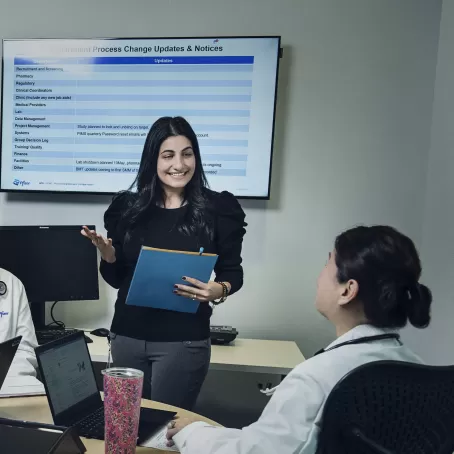Step by step.
That’s how complex clinical research gets done. It’s how medical science advances.
And during a clinical study, Claudine Fredette’s job is to make sure all those steps get taken - to keep track of a study at the PCRU from start to finish.
And besides the overall execution, the PCRU also assures data quality, integrity, and compliance with regulatory requirements.
“I’ll have meetings every week with all the departments at the PCRU - Recruitment, Pharmacy, the clinic, the lab, Finance, everyone,” she says.
“We identify what needs to happen next, what the challenges might be, and how to overcome those challenges to get it done.”
It’s a job that requires a great deal of energy and organization - and a lot of spreadsheets.
“It can get overwhelming if you think about it,” says Claudine. “But honestly, I just go step by step.”
“I’d keep reminding them that they were achieving what would have previously seemed impossible,” she says. “We were making a difference.”
As Claudine explains, the PCRU is unique in the world of clinical research. Most clinical trials take place at outsourced centers.
“But the PCRU is a part of Pfizer,” Claudine says. “Being internal allows us to follow a potential medication from the very beginning of its development,” she says.
It also allows Claudine to act as a communication bridge, back and forth. “It means we are able to have a lot of input on how a study runs at the PCRU,” Claudine explains.
The PCRU’s unique position keeps it nimble, efficient, and responsive - all of which became especially important when the PCRU was selected to host the study of a drug that might help against COVID-19.
As a 12-year Pfizer veteran, Claudine considers her job to be a blessing, and she’s grateful to be able to meet the challenges each new trial presents.
But she also knew that for this COVID trial, the PCRU would be tasked with solving a completely new kind of challenge. They’d need to do their jobs with an urgency and efficiency unprecedented in modern medical research.
As the Project Manager for the phase 1 study, it would be up to Claudine to set record timelines, compressing the work of weeks or months into days or hours while maintaining the same strict standards for the safety and the science.
The PCRU team would have to find new ways to work smarter, faster, and harder.
And they’d need to do it in the middle of a pandemic.
As the two-month study expanded to six months, Claudine’s to-do list kept growing. In trying times, Claudine says, part of her job is to be a sort of “cheerleader,” keeping her team motivated and energized with high fives, GIFs and positivity. “I’d keep reminding them that they were achieving what would have previously seemed impossible,” she says. “We were making a difference.”
Claudine is passionate about her work, and she likes to stay busy - “and with five kids at home, that usually isn’t a problem,” she laughs - but the COVID trial was a true test.
“There were lots of times where I would just put the kids to bed and work until 1, 2:00 o'clock in the morning on the computer. There were several times where I couldn’t sleep at night because I'm thinking, you know, like - are we going to pull it off? Are we not going to pull it off?”
But she also knew that whatever it took, the PCRU team would find a way to get it done.
“That's the mindset I have,” she says. “I will not have a goal fail on me. If it's in my control, I will do whatever it takes. Because failing was not an option.”
